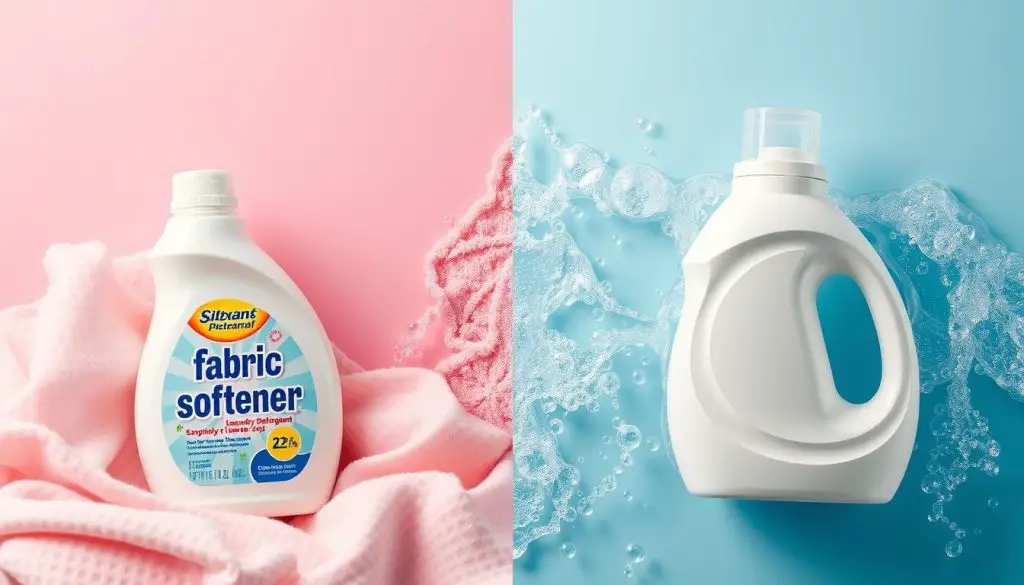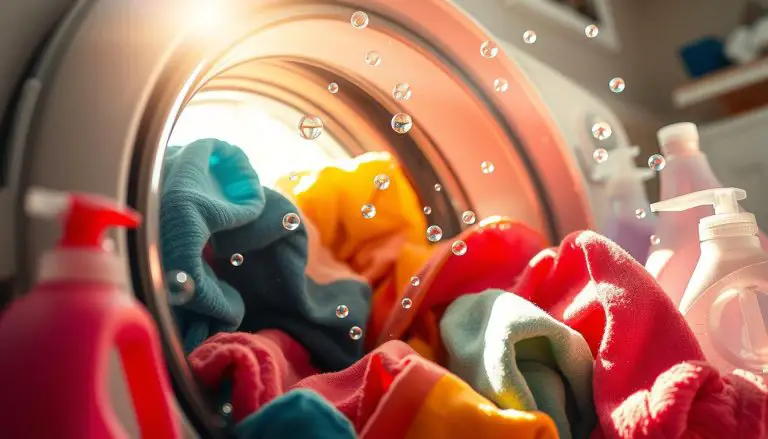Many of us wonder if fabric softener really cleans our clothes. Or is it just an extra step in our laundry routine? Let’s dive into the world of fabric softener for laundry and find out its true purpose and effects on our clothes.
Fabric softener is a conditioner for our clothes, bedding, and other items we wash. But it’s not meant to clean or remove stains. It’s designed to make our clothes feel softer and smell fresher.
As we explore the science behind fabric softener, we’ll look at its benefits and drawbacks. This will help us make better choices for our laundry care. Does fabric softener clean clothes, or is it just for comfort and freshness?
We’ll uncover the truth as we discuss fabric softener’s role in our daily lives.
Table of Contents

What Fabric Softener Actually Does
Many of us use fabric softener to make our clothes softer and smell better. But have you ever thought about how it works? It contains fatty acids that stick to the clothes, making them feel softer.
The fatty acids in fabric softener reduce friction between fibers. This makes clothes feel softer and smoother. It also protects them from damage during washing.
The ingredients in fabric softener are key to its success. Quaternary ammonium compounds help reduce static and make clothes softer. These chemicals coat the fibers, making them feel fresher and smoother.
The Basic Function of Fabric Softener
Fabric softener makes fabrics feel better. It reduces static, minimizes wrinkles, and keeps clothes smelling fresh. It works by coating the fabric to reduce friction and static.
Key Ingredients in Fabric Softener
Fabric softener includes quaternary ammonium compounds, fatty acids, and fragrances. These ingredients make fabric softer, reduce static, and make ironing easier.
How Fabric Softener Works on Fibers
Fabric softener coats fibers with chemicals during washing. This reduces friction, making fabric softer and smoother. It also protects clothes from damage, making them feel softer.
- Softer fabric
- Reduced static cling
- Easier ironing
- Enhanced freshness
- Color preservation
Fabric softener is a helpful laundry product. It makes fabrics feel better and last longer. By understanding how it works, we can use it wisely.
Does Fabric Softener Clean Clothes? The Truth Revealed

Many of us ask, does fabric softener clean clothes? The answer is no. Fabric softener doesn’t clean clothes. It’s meant to soften fabrics, not remove stains. Knowing the difference between fabric softener vs detergent is key.
Fabric softener’s main job is to stop clothes from clinging together and make them softer. But it doesn’t get rid of dirt, grime, or stains. Using it can even make clothes less breathable and absorbent.
Choosing the right product for your laundry is important. Fabric softener is great for softening clothes and reducing static. But, it’s not a substitute for a good detergent. Use detergent to clean your clothes, then fabric softener to condition them.
Some fabric softeners, like Downy and Bounce, have been criticized by the Environmental Working Group for toxic ingredients. It’s important to check what’s in your fabric softener. Choose safer options. Knowing the difference between does fabric softener clean clothes and fabric softener vs detergent helps you make better laundry choices.
The Real Benefits of Using Fabric Softener
We’ve looked at how fabric softener fits into our laundry routine. Now, let’s dive into its benefits. One big plus is that it reduces static cling, making clothes more comfy. It also helps cut down on wrinkles, saving us time and effort when ironing. Plus, the best fabric softener can make our laundry smell great, leaving it fresh and clean.
Some of the key benefits of using fabric softener include:
- Reduced static cling: Fabric softener helps to eliminate static electricity, making our clothes less prone to clinging and twisting.
- Wrinkle prevention: By lubricating fibers, fabric softener can help reduce wrinkles, making our clothes look smoother and more polished.
- Fragrance enhancement: Fabric softener can leave a lasting, pleasant scent on our clothes, keeping them smelling fresh and clean.
When picking a fabric softener, think about what you need. Choose the best fabric softener for cleaning clothes that fits your needs. This way, we get to enjoy its benefits while taking care of our clothes and the planet.
| Benefit | Description |
|---|---|
| Static reduction | Reduces static cling, making clothes more comfortable to wear |
| Wrinkle prevention | Helps reduce wrinkles, saving time and effort when ironing |
| Fragrance enhancement | Leaves a lasting, pleasant scent on clothes |
Common Misconceptions About Fabric Softener in Laundry
We often think fabric softener is key for clean, fresh clothes. But, it’s not always necessary. In fact, it can harm some fabrics. For example, it might make towels less absorbent or affect sportswear’s performance.
Many believe fabric softener is needed for every laundry load. But, that’s not true. Some fabrics, like microfiber or moisture-wicking sportswear, shouldn’t use fabric softener. It can damage the fabric and lessen its effectiveness. The fabric softener effectiveness really depends on the fabric and its use.
Here are some common mistakes to avoid when using fabric softener:
- Using fabric softener on all types of fabrics, including those that should not be washed with it
- Not following the manufacturer’s instructions for use
- Not considering the potential negative effects of fabric softener on certain fabrics
By knowing these fabric softener misconceptions, we can make better choices for our laundry. This way, our clothes get the best care possible.
| Fabric Type | Recommended Care |
|---|---|
| Microfiber | Avoid fabric softener |
| Moisture-wicking sportswear | Avoid fabric softener |
| Towels | Use fabric softener sparingly |
When to Use (and Not Use) Fabric Softener
Ever wondered when to use fabric softener for laundry? It’s all about knowing which fabrics it helps and which it doesn’t. Fabric softener makes clothes softer and fresher. But, using it wrong can harm the clothes’ absorbency or even damage fibers.
Some clothes, like towels and sportswear, shouldn’t be washed with fabric softener. It can make towels less absorbent and ruin the moisture-wicking of sportswear. Yet, cotton, linen, and rayon fabrics benefit from it, as it reduces static and makes them softer.
To get the most out of fabric softener, always follow the label’s instructions. Too much can cause residue buildup, making clothes less soft over time. By using it right and choosing the right fabrics, we can keep our clothes soft, fresh, and in good condition.
| Fabric Type | Use Fabric Softener |
|---|---|
| Cotton, Linen, Rayon | Yes |
| Towels, Sportswear, Moisture-wicking garments | No |
| Flame-retardant clothing | No |
By following these tips and using fabric softener wisely, we can make our clothes feel soft, fresh, and look great.
Natural Alternatives to Traditional Fabric Softeners
We’re always looking for ways to make our laundry routine better for the planet and our clothes. Exploring natural alternatives to traditional fabric softeners is a great way to do this. These options can cut down on fabric softener residue and lessen the environmental harm from our laundry.
Popular natural alternatives include white vinegar, baking soda, and wool dryer balls. They can soften clothes and reduce static without harsh chemicals. For instance, white vinegar can soften fabrics and remove odors naturally. Wool dryer balls, made from natural wool, also soften fabrics and cut down on static.
- Using essential oils to give your clothes a fresh scent
- Adding a 1/2 cup of baking soda to your wash cycle to soften fabrics and eliminate odors
- Trying plant-based solutions like Spruce Laundry Sheets, which are a safe alternative to traditional laundry detergents
Switching to naturalfabric softener alternatives helps us avoid harsh chemicals. It also makes our laundry routine more eco-friendly.
Conclusion: Making the Right Choice for Your Laundry
Fabric softener can make clothes softer, reduce static, and smell nice. But, it’s not needed for cleaning clothes. That’s what laundry detergent is for. Think about what you need and want for your laundry to decide if fabric softener is right for you.
If you want softer clothes, less static, and a nice smell, fabric softener is good. But, if you have special fabrics or sensitivities, try vinegar or wool dryer balls. Try different things to see what works best for you.
Whether or not to use fabric softener is your choice. Knowing its benefits and how to use it helps you make the best decision. Enjoy the soft, fresh, and static-free clothes that fabric softener can give you.
Related Articles:

